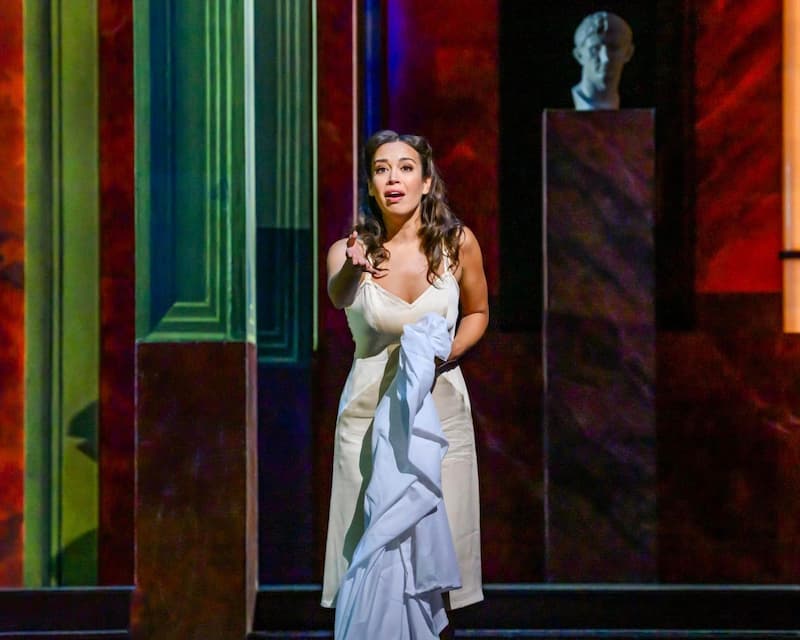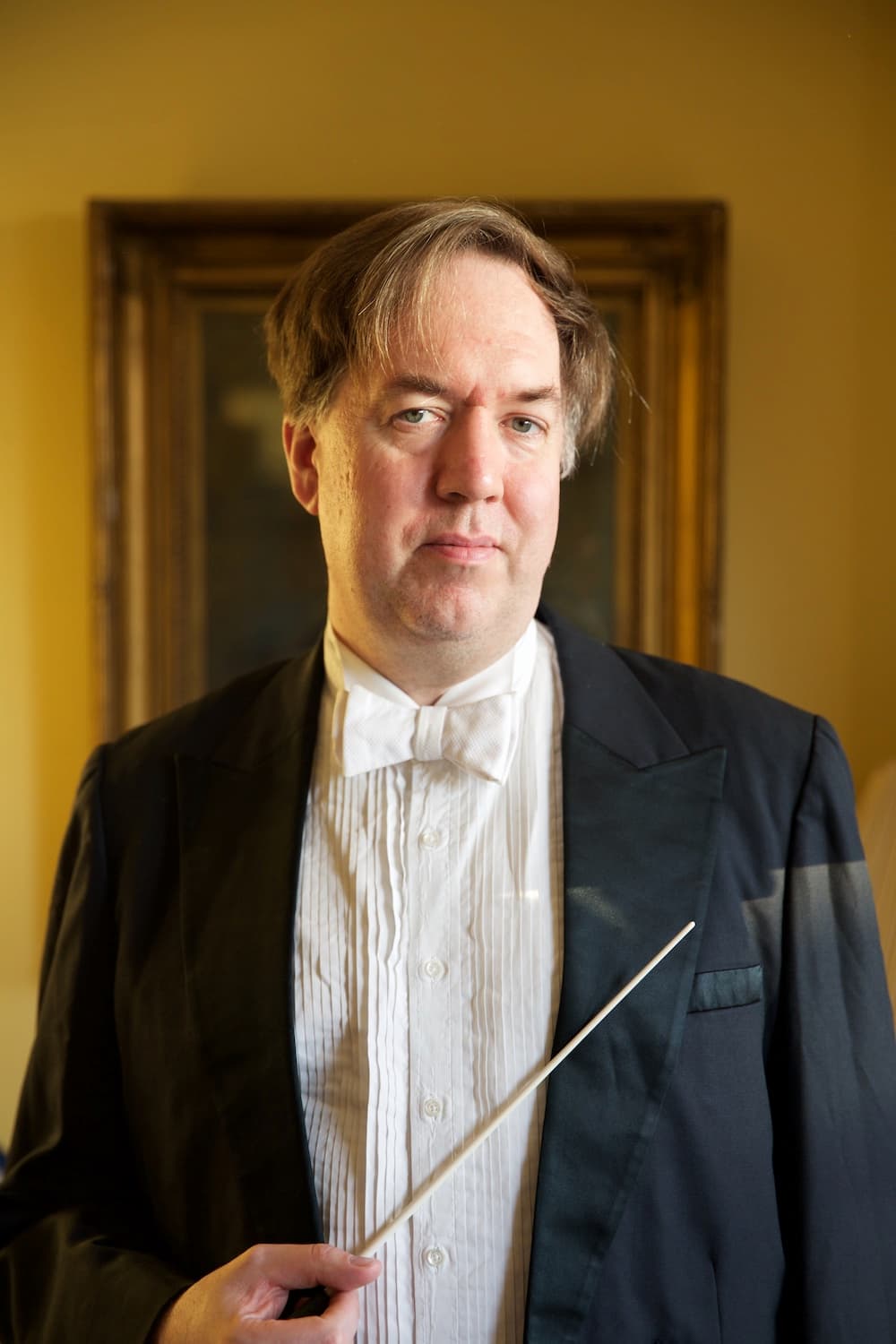Mozart Will Survive
Violinist Aleksey Igudesman and pianist Hyung-ki Joo, better known as Igudesman & Joo, have performed their riotous duo shows all over the world, working alone as well as alongside major orchestras, sending up classical music to packed audiences at venues including the Sydney Opera House, Carnegie Hall, and Wiener Konzerthaus.
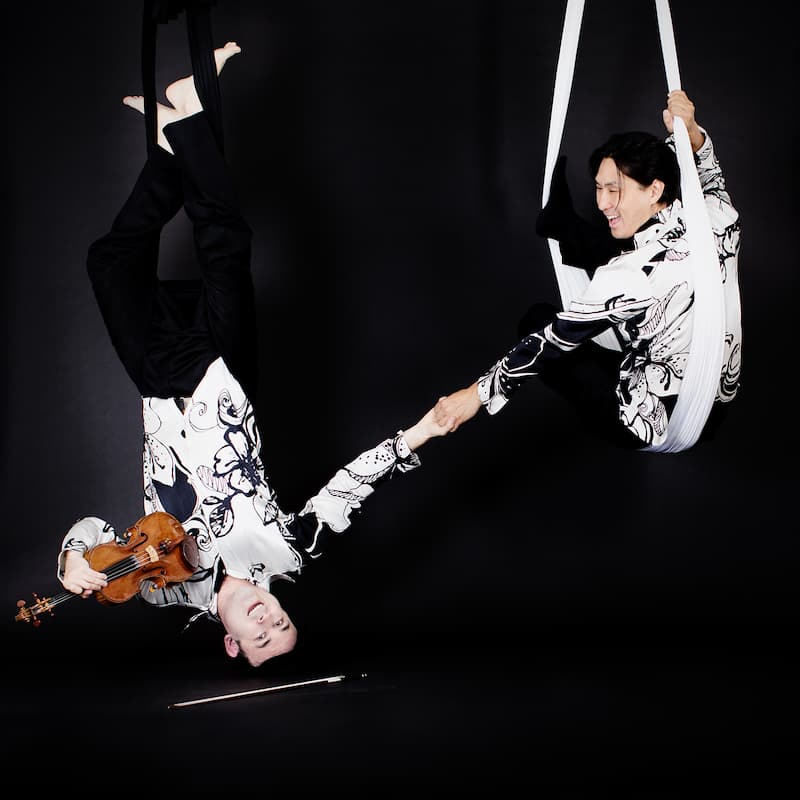
Igudesman & Joo © Julia Wesely
In their own words, their shows ‘combine humour, classical music and allusions to pop culture’, and leave audiences in stitches as they shine a light on many of the quirks and absurdities found in our industry that we otherwise take for granted.
Both Aleksey and Hyung-ki are highly in demand as soloists in their own right. Away from the duo, Hyung-ki will be in Hong Kong this October, working with the Hong Kong Sinfonietta on his own project, Haydn Seek. He tells me about this project, along with how the duo started, and how he holds onto the sense of fun he finds in his work.
How did you two meet?
I was born in Norwich, England, and when I was about ten years old I went to the Yehudi Menuhin School, which is a bit like Hogwarts for musicians. About two years later some guy called Aleksey Igudesman showed up, […] and it was hate at first sight. He used to beat me up for quite some time.
I decided one day to share a portion of fish and chips with him, fish and chips being the English local delicacy. I was at his door with this fish and chips and he looked at me like, ‘Do you want to die?’ But he saw this food, this gorgeous food, glistening and steaming (and English boarding school food is so bad), so he probably thought, ‘Well I’ll go for the food first and then I’ll beat him up’.
So we sat in silence and ate. It was like the cold war, but then the ice broke and we started talking, and we realised we had so much in common, and from that point on we were pretty much inseparable.
How did Igudesman & Joo come about?
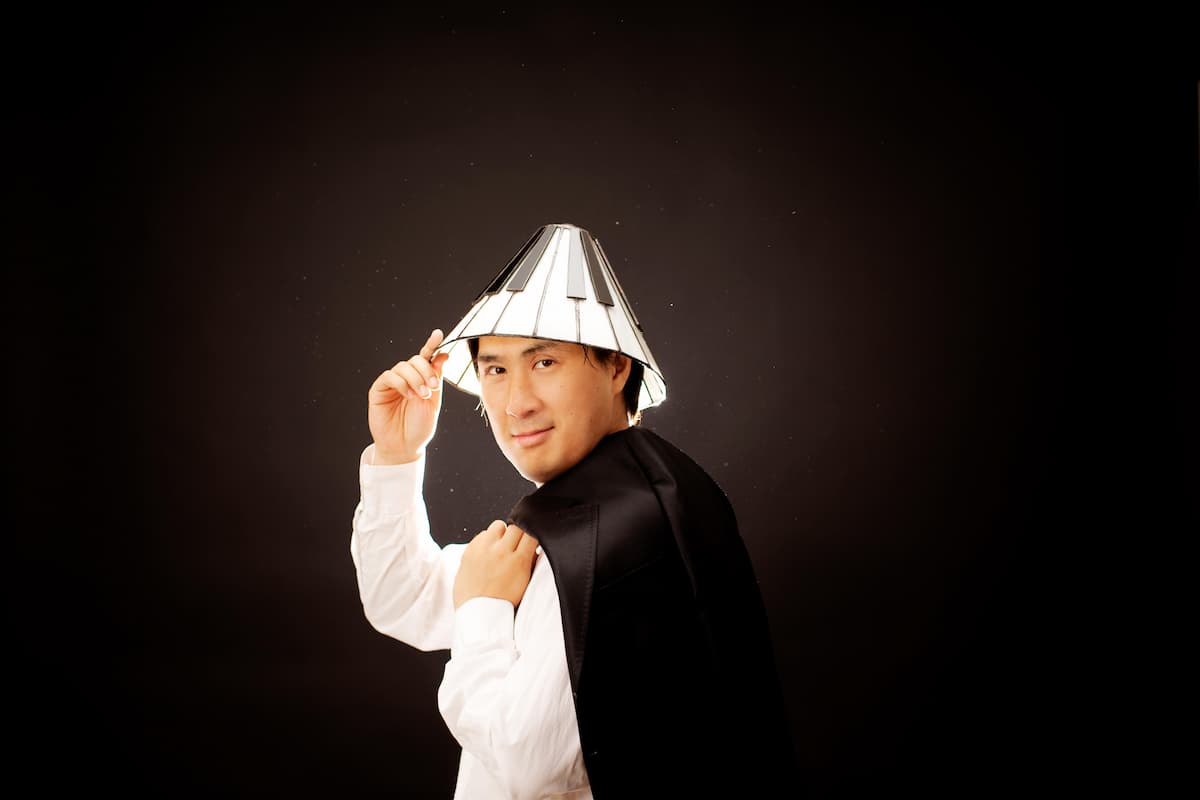
Pianist Hyung-ki Joo © Julia Wesely
We realised pretty soon that we were very passionate about music, that we were crazy about music, but somehow something seemed to be a little off. We would go to concerts and we just found the whole atmosphere very elitist, very stuffy, very up itself, taking itself way too seriously, and actually sort of tainting the enjoyment of classical music.
Me, personally, I always felt like there was nobody who loved classical music more than me in the world. It’s a feeling that I had, and it’s a feeling that I still have, and I thought to myself, ‘If the guy who loves classical music more than anybody else in the world wants to leave the concert hall, Houston, we have a serious problem.’
So I realised, as did Aleksey, that we needed to do something. We didn’t know exactly what, but we thought, ‘OK, at least we’re going to try and create concerts that we would want to go to ourselves.’
We did some historical research and we realised that in the times of Beethoven, Mozart and Liszt, concerts were much more open. There was almost no divide between the artist and the public. Liszt famously used to step down from the piano and go and speak to audience and have a glass of wine with them and then return to the podium and play. He’s considered the father of the recital, so why don’t we pay some attention to him?
There was not total silence, there was not this ceremonial funereal stigma about it. Really, people like Wagner and Mahler kind of ruined it, although I love [the music of] Mahler and Wagner. They turned it into a much more solemn, ceremonious affair – banning applause between movements, making the lights go down, making the orchestra invisible.
As a serious musician I totally understand that music needs to be appreciated in silence and with full attention, but today we are in the 21st century, and people’s attention spans are short.
We are inundated with quick-fire images, social media, things that catch our attention. Classical music is an art form that is basically hundreds of years old, and we need to find a way to make it relevant today, otherwise people will not go to concerts.
Again: I do not want to go to concerts, so why would some kid want to go to concerts? Something has to happen. And we don’t say that we’re the only way. We just think that humour and theatricality and other types of music can all belong in the concert hall.
What advice would you give to younger musicians on how to retain the sense of fun during what can be quite rigorous training?
I personally think that the entire music education system needs to be refreshed, revised. The problem is that when people go to study music, they might have a good teacher, they might achieve high feats of things, but they are completely unequipped to deal with everything else that has to do with being a musician.
The problem is there’s such a concentration on having to be ‘perfect’, whatever that means. But then you get cornered into this area of fear: fear of failing. And when you’re in that place of fear, creativity has no room to breathe and breed, because you don’t give yourself the chance to screw up.
As we well know with so many great inventions in the world, they all happened out of error or experiment, trying something that no-one has ever tried before.
You obviously have a lot of fun performing in your shows, but it’s clear that there’s also a great respect for the music.
One of the things Aleksey and I say when we work with orchestras is, ‘Okay, listen. For us, music always comes first. Absolutely all our stuff comes from the music.’
We are not clowns who play music. We are musicians who fool around, who have fun with music. We never make fun of the music. We never make fun of specific musicians or anything like that. We are satirical at times, but we don’t make anyone look bad. We definitely make fun of the whole musical ceremony and musical situation, and jokes within the music.
So we have fun with music, that’s very important. And I think this is also why orchestras collaborate with us, or well-known personalities like Emmanuel Ax, Joshua Bell, Yuja Wang, [why] these guys would dare to be on stage with us, because they recognise we’re serious musicians.
“Moore” Alla Molto Turca- Igudesman & Joo with Roger Moo7e
How much is planned in your shows, and how much is left to chance?
Whether we’re rehearsing just the duo or rehearsing with an orchestra, everything is notated meticulously and precisely, as meticulously and precisely as one can possibly notate something. And when it comes to the two of us, obviously we have more freedom [than with an orchestra], but we rehearse everything.
Sometimes we have enormous arguments just over the word ‘and’ or ‘but’. We have these stupid arguments, but that’s our attention to the detail, as to whether just one word is important or not.
An actor we work with quite often, John Malkovich, told us a wonderful thing. He said, ‘When you get out on stage, you have to let the work take over,’ instead of trying to just do what you rehearsed.
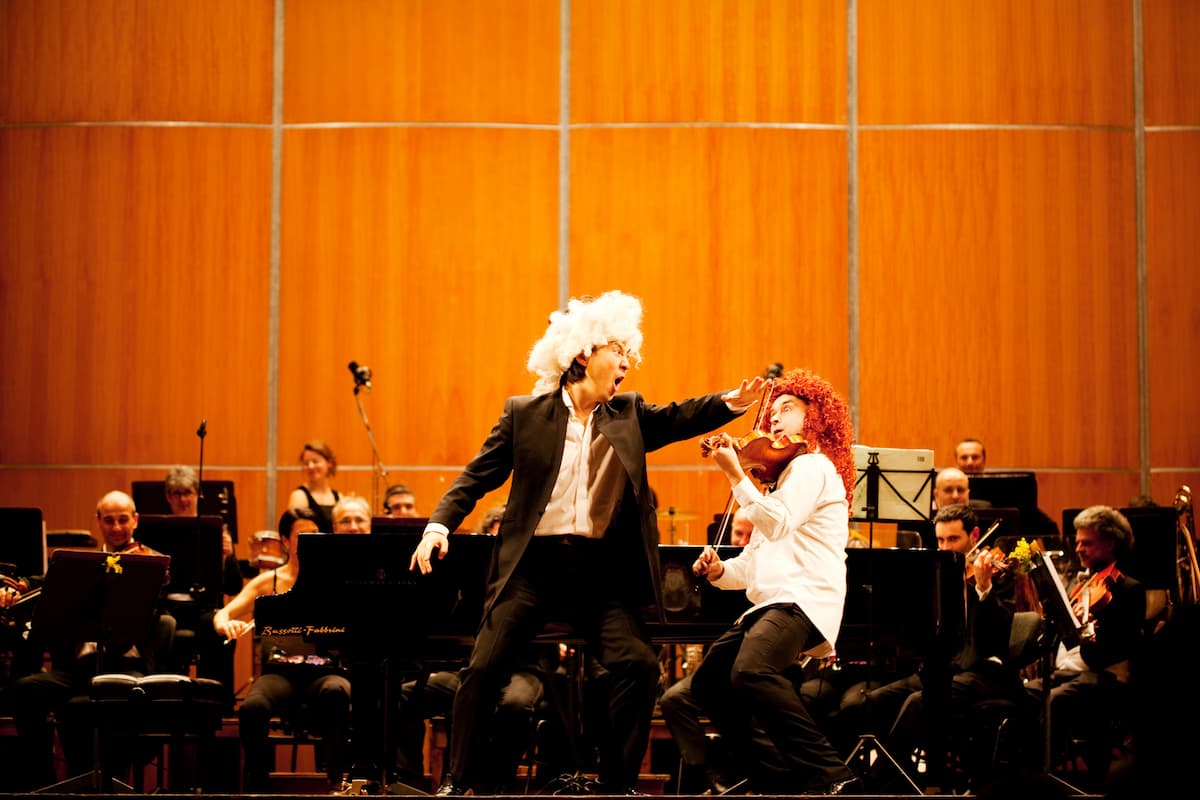
Igudesman & Joo in the show Big Nightmare Music
So we prepare meticulously in order that we can enjoy every mistake, every screwup, every little thing that we feel from the audience. We stick to a plan in order that we can completely leave the plan.
Because otherwise, what’s the point? You might as well just make something that you can put in the freezer than you can take out and reheat. It has to be alive, it has to live.
That feeling of not knowing what’s going to happen, and the element of surprise, and living it as it’s unfolding, for me that’s the key to the difference between something that’s an enthralling musical experience and something that’s just an academic lecture.
Sometimes a string breaks or something goes wrong, which of course is unfortunate for the situation in the performance, but you see how much the audience loves it, and they become alive. And if you can somehow use that difficulty, use that situation, to turn it into something else, then you’re a superhero.
Tell us about Haydn Seek.
I think Haydn is one of the most underrated composers. Everybody historically puts him on a pedestal, he was Beethoven’s teacher, but Haydn is rarely programmed, and no-one really realises how much humour and theatricality and innovation this guy had.
There’s this piece, Il Distratto, Haydn’s Symphony No. 60. The last movement starts and about five seconds later, it stops, and the violins start tuning, as if to say they didn’t have time to tune earlier. I take exactly that but just exaggerate it a bit more.
I’ve taken the music of Haydn and not messed around with it – the music is still very much the original, authentic music – I’ve just enhanced the theatricality and humour of it, so it can be transported to today’s 21st century.
For more of the best in classical music, sign up to our E-Newsletter
Slow Motion Orchestra! Chariots of Fire Igudesman & Joo style. (Music by Vangelis)

